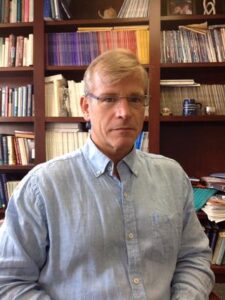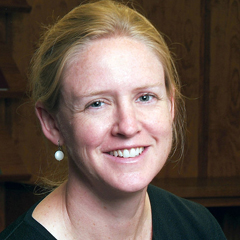
Thomas G. O'Connor, Ph.D.
Professor, Department of Psychiatry
Director, Wynne Center for Family Research
University of Rochester Medical Center

Thomas G. O'Connor, Ph.D.
Professor, Department of Psychiatry
Director, Wynne Center for Family Research
University of Rochester Medical Center
Abstract: There is now a great deal of clinical and theoretical regard for the role that early stress may play in long-term behavioral and physical health outcomes. This area of research encompasses many broad and substantial models of human development (e.g., “developmental programming”), engages several competing and complementary biological mechanisms (e.g., stress physiology, [neuro]inflammation), and requires an impressive array of research techniques (e.g., neuroimaging, behavioral manipulations). In the course of this presentation, we will consider some of these, and focus particularly on the goodness of fit between alternative models and available evidence. We will also consider how a trans-disciplinary approach, which is needed for this kind of study, presents practical challenges for research and training.
Thursday, September 21, 2017
The Child Study Center’s 2017 Lois Bloom Lecture
4:15 p.m., The Nittany Lion Inn
6th Annual Solutions Network Conference: Scientific Synergy and Innovation from Military Family and Child Welfare Contexts
Co-Sponsored by the Child Study Center
Wednesday, September 27, 2017, to Thursday, September 28, 2017
Nittany Lion Inn

Stephanie M. Jones, Ph.D.
Marie and Max Kargman Associate Professor
Human Development and Urban Education Advancement
Harvard Graduate School of Education

Stephanie M. Jones, Ph.D.
Marie and Max Kargman Associate Professor
Human Development and Urban Education Advancement
Harvard Graduate School of Education
“Social-Emotional Learning: A Principled Science of Human Development in Context”
Abstract: In this presentation, Dr. Jones will summarize results from randomized trials of social-emotional learning programs designed for early and middle childhood. She will highlight findings from two longitudinal, experimental evaluations to illustrate important developmental and setting-driven effects. The presentation will cover challenges and opportunities in conducting place-randomized trials of social-emotional learning programs, examining issues of definition, operationalization, and measurement in particular. Dr. Jones will finish with a discussion of the implications of this body of work for translational research, education reform, and the developmental and prevention sciences.
Co-Sponsored with the Edna Bennett Pierce Prevention Research Center
Dr. Jones is also presenting the BENNETT LECTURE
Thursday, October 19, 2017
4:00 p.m., 22 BBH Building
“New Frontiers in the Science and Practice of Social-Emotional Learning in Preschools and Schools“
Wednesday, October 18, 2017
4:15 p.m., The Nittany Lion Inn, Alumni Lounge
25th Annual National Symposium on Family Issues – Families and Technology
Co-Sponsored by the Child Study Center
Monday, October 23, 2017, to Tuesday, October 24, 2017
Nittany Lion Inn, Boardroom

Elizabeth Shirtcliff, Ph.D.
Associate Professor, Human Development and Family Studies
Iowa State University

Elizabeth Shirtcliff, Ph.D.
Associate Professor, Human Development and Family Studies
Iowa State University
“Growing Up is Hard to Do: A Biomarker Perspective on Development”
Abstract: Dr. Shirtcliff obtained her PhD in biobehavioral health from Penn State in 2003 and has gone on to conduct developmental psychobiology research on adolescent health and wellbeing. The talk will explore the functional role of common biomarkers in the body – including cortisol, testosterone, and oxytocin – and will examine whether the purpose of these biomarkers changes across the lifespan, particularly during the developmental switchpoint of adolescence. For example, rather than view cortisol as a “stress hormone”, Dr. Shirtcliff will describe cortisol as a biomarker which allows the individual to be more open to salient social cues in their environment. Across development, cortisol will continue to serve that function, but the meaning of “salient” is thought to shift away from parents, toward internal self-regulation, and eventually toward romantic partners. This functional role of these biomarkers will then be framed further in a life history perspective, by considering how early adversity alters the timing and tempo of a suite of maturational events that are influenced by these hormonal biomarkers.
Thursday, January 25, 2018
4:15 p.m., 127 Moore Building

Kirby Deater-Deckard, Ph.D.
Professor of Psychological and Brain Sciences
UMass Amherst
Director, Developmental Science Initiative

Kirby Deater-Deckard, Ph.D.
Professor of Psychological and Brain Sciences
UMass Amherst
Director, Developmental Science Initiative
“Parenting and Self-Regulation in the Family”
Abstract: In this presentation, I will provide an overview of an ongoing collaborative program of research examining the intergenerational transmission of self-regulation in families across a wide range of contexts. The development of individual differences in cognitive, emotional, behavioral and physiological self-regulation arises from complex transactions between biological and environmental influences. Parenting plays a key role, and is itself influenced by adults’ self-regulation. These family processes can be disrupted by chronic stressors. The emerging literature on parenting and intergenerational transmission of self-regulation is providing new insights for prevention and intervention.
Thursday, March 15, 2018
4:15 p.m., 127 Moore Building

Daniel S. Shaw, Ph.D.
Distinguished Professor, Department of Psychology
University of Pittsburgh

Daniel S. Shaw, Ph.D.
Distinguished Professor, Department of Psychology
University of Pittsburgh
“The Prevention of Early Conduct Problems: From Identifying Targets to Intervention Development and Implementation”
Abstract: The current talk will discuss how our research in the identification of risk factors for preventing early-starting conduct problems has progressed from identifying malleable targets of change to adapting and testing the effectiveness of the Family Check-Up for at-risk, low-income toddlers. The remaining time will be spent discussing the use of the Family Check-Up and a more universal intervention, Video Interaction Project, in multiple platforms serving low-income children, many of which have not typically provided mental health services. These platforms include pediatrics, birthing hospitals, Early Head Start and Head Start centers, WIC, child welfare, and family support centers serving low-income families with young children in the Pittsburgh metropolitan area. Both early successes and (many) remaining challenges will be considered.
Tuesday, April 3, 2018
1:30 p.m., 127 Moore Building

Kimberly Shonert-Reichl, Ph.D.
Professor, Educational and Counseling Psychology, and Special Education
University of British Columbia, Vancouver

Kimberly Shonert-Reichl, Ph.D.
Professor, Educational and Counseling Psychology, and Special Education
University of British Columbia, Vancouver
“A New Kind of Fitness: Strengthening Social and Emotional Competence and Well-being of Children Through Social and Emotional Learning”
Abstract: In this presentation, Dr. Schonert-Reichl will discuss how the field of Social and Emotional Learning (SEL) has expanded during the past decade across the world, providing specific examples of how SEL is being integrated into educational policy and practice. She will then discuss some of the necessary ingredients for expanding SEL into the very fabric of education, including the need for rigorous research, systemic integration of SEL into schools and communities, and integrating SEL into educator preparation. Dr. Schonert-Reichl will draw from her own research on specific SEL programs that focus on promoting empathy, kindness, and altruism, discussing both methodological and practical issues when conducting research in schools. Directions for future work will also be discussed.
Co-sponsored with the Edna Bennett Pierce Prevention Research Center
Dr. Schonert-Reichl is also presenting the 2018 LECTURE ON COMPASSION
Thursday, April 19, 2018
4:00 p.m., 22 Biobehavioral Health Building/Ruth Pike Auditorium
Wednesday, April 18, 2018
4:15 p.m., 104 Rackley Building
Reception in the Moore Building Atrium